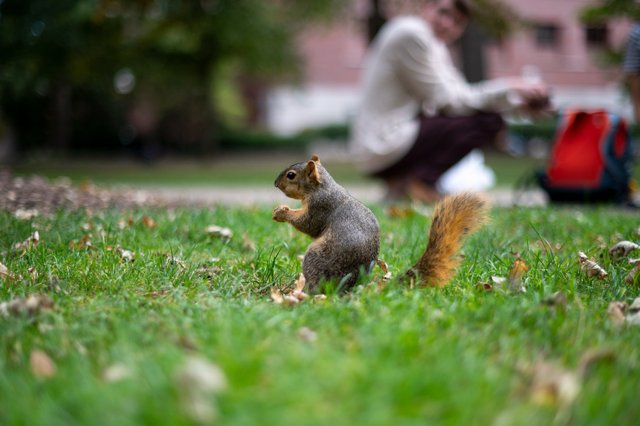Once and for all: should we feed the squirrels?
Once and for all: should we feed the squirrels?
From wading through the fountain by the bell tower the first week of freshman year to cautiously avoiding the “M” on the Diag, to be a Michigan student is to participate in a rich array of traditions. To some, these customs include feeding squirrels on a sunny day. So, the question stands, once and for all, should we feed the squirrels?
Nursing senior Autumn Farnum is the co-president of The Squirrel Club at the University of Michigan, an organization of students, alumni and members of the Ann Arbor community that feed squirrels during the school year every Sunday. Farnum said they believe feeding squirrels is a good way to build a campus community, as long as they are fed healthy food.
“Having the connection between the wildlife and our students here kind of builds that friendly campus environment that we have and also makes sure that (the squirrels) have a nice treat once in a while,” Farnum said.
While Farnum — and campus tour guides — embrace squirrel feeding, animal welfare organizations have raised concerns over feeding the furry creatures. Squirrels who are fed by people can become dependent on handouts occasionally never regaining self-sufficiency. Feeding squirrels can also contribute to their overpopulation in certain areas as the squirrels adapt to reside in areas where human handouts are popular, such as parks and urban areas.
When humans feed squirrels, whether on campus or in other areas, squirrels can lose their natural fear of humans. Ann Arbor’s fearless squirrels often approach students, especially around the Diag, because they are so often fed there.
LSA sophomore Alanna Carlo-Pagan is a member of the Animal Ethics Society, an organization dedicated to furthering discussion about the ethical treatment of animals through philosophy, and often volunteers for The Creature Conservancy in Ann Arbor. Carlo-Pagan said it is important to think about the impact humans’ actions have on animal behavior when feeding animals like squirrels.
“What you have to take into account when you’re measuring the impact of human behavior on the environment is how it’s gonna affect humans, how it’s gonna affect other species and how it might affect that species,” Carlo-Pagan said. “What people are mostly concerned about is how it just rubs patterns of migration and food seeking behavior and how it might lead animals to become so trusting of humans – or imprinted on humans – that they’re unable to actually go out and look for food on their own.”
Squirrels can also cause problems for local residents, as they can destroy property and carry disease in highly populated areas. The Centers for Disease Control and Prevention says while it is extremely unlikely for squirrels to contract rabies or carry the rabies virus, they can carry other diseases like typhus and ringworm.
Despite these concerns, many students actively partake in feeding the squirrels on campus and befriending the creatures. LSA freshman Julia Holden said feeding squirrels on campus is fun for her and her friends, and it is a nice way for students to get outside.
“It’s just fun, honestly,” Holden said. “It’s just nice to be around animals. It’s a good way to get outside. They obviously aren’t antsy about being around people. So, I mean, they’re here anyways. Why not?”
Holden said squirrels might often be fed the wrong foods, but she is careful to feed them healthy nuts that the animals can digest.
“I’m sure they get enough not good food,” Holden said. “I have organic, unsalted walnuts. So, I think if you’re feeding them the right thing, it’s probably okay.”
Farnum echoed Holden’s emphasis on feeding squirrels nutritional foods.
“The peanuts we give (squirrels) help them control their teeth growth because gnawing on stuff helps their teeth,” Farnum said. “I just think it’s specifically like what is decided to feed them (that is important) because a lot of foods that are salty overload their kidneys, and it’s just not good for them.”
Carlo-Pagan said she believes since U-M students have been feeding the squirrels on campus for so long, it’s almost impossible to imagine how to discontinue campus squirrels’ imprint on humans.
“I have seen the way the Diag squirrels literally come up to and sit on top of people,” Carlo-Pagan said. “So, what I’m thinking is we’re well past the point where it would matter (if students fed them or not).”
As a new student on campus, Holden said she thinks feeding the squirrels gives students a break from their campus activities and a moment to relax outdoors.
“They come up to you and they’re looking at you like, ‘do you have anything for me?’” Holden said. “And I was like, I’m just gonna go buy some snacks, and I took my friend to do it. She was like, ‘this is like the happiest I felt in weeks.’”

.jfif)
